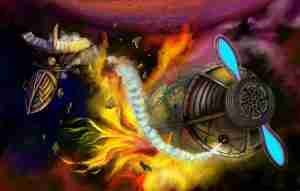That old rascal, Bertrand Russell illustrates that the philosophic burden of proof lies upon a person making scientifically unfalsifiable claims. More specifically, proof of God’s existence relies on the person making the claim. Of course, Operation Cosmic Teapot assumes that several gods exist, so, you know…. what-everrrrr. Russell’s original argument goes like this:
If I were to suggest that between the Earth and Mars there is a china teapot revolving about the sun in an elliptical orbit, nobody would be able to disprove my assertion provided I were careful to add that the teapot is too small to be revealed even by our most powerful telescopes.
But if I were to go on to say that, since my assertion cannot be disproved, it is an intolerable presumption on the part of human reason to doubt it, I should rightly be thought to be talking nonsense.
If, however, the existence of such a teapot were affirmed in ancient books, taught as the sacred truth every Sunday, and instilled into the minds of children at school, hesitation to believe in its existence would become a mark of eccentricity and entitle the doubter to the attentions of the psychiatrist in an enlightened age or of the Inquisitor in an earlier time.





